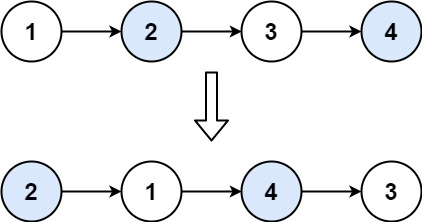티스토리 뷰
Problem
Given a linked list, swap every two adjacent nodes and return its head. You must solve the problem without modifying the values in the list's nodes (i.e., only nodes themselves may be changed.)
Example 1:

Input: head = [1,2,3,4]
Output: [2,1,4,3]Example 2:
Input: head = []
Output: []Example 3:
Input: head = [1]
Output: [1]Constraints:
- The number of nodes in the list is in the range [0, 100].
- 0 <= Node.val <= 100
Solution
연결 리스트가 주어질 때 모든 인접한 두 노드를 swap 시켜서 반환하는 문제입니다.
두 개의 포인터를 이용해 간단하게 구현할 수 있습니다.
import io.lcalmsky.leetcode.ListNode;
public class Solution {
public ListNode swapPairs(ListNode head) {
if (head == null || head.next == null) {
return head;
}
ListNode result = new ListNode(0);
result.next = head;
ListNode current = result;
ListNode slow;
ListNode fast;
while (current.next != null && current.next.next != null) {
slow = current;
current = current.next;
slow.next = current.next;
fast = current.next.next;
current.next.next = current;
current.next = fast;
}
return result.next;
}
}Test
package io.lcalmsky.leetcode.swap_node_in_pairs;
import static org.junit.jupiter.api.Assertions.assertAll;
import static org.junit.jupiter.api.Assertions.assertEquals;
import io.lcalmsky.leetcode.ListNode;
import org.junit.jupiter.api.Test;
class SolutionTest {
@Test
void testAll() {
assertAll(
() -> test(ListNode.of(1, 2, 3, 4), ListNode.of(2, 1, 4, 3)),
() -> test(ListNode.of(), ListNode.of()),
() -> test(ListNode.of(1), ListNode.of(1))
);
}
private void test(ListNode given, ListNode expected) {
// when
Solution solution = new Solution();
ListNode actual = solution.swapPairs(given);
// then
assertEquals(expected, actual);
}
}ListNode.java 전체 보기
package io.lcalmsky.leetcode;
import java.util.Objects;
public class ListNode {
public int val;
public ListNode next;
public ListNode(int val) {
this.val = val;
}
public static ListNode of(int... integers) {
if (integers == null || integers.length == 0) throw new IllegalArgumentException();
ListNode head = new ListNode(0);
ListNode last = head;
ListNode p;
for (int integer : integers) {
p = new ListNode(integer);
last.next = p;
last = last.next;
}
return head.next;
}
@Override
public String toString() {
return "ListNode{" +
"val=" + val +
", next=" + next +
'}';
}
@Override
public boolean equals(Object o) {
if (this == o) return true;
if (!(o instanceof ListNode)) return false;
ListNode listNode = (ListNode) o;
return val == listNode.val &&
Objects.equals(next, listNode.next);
}
@Override
public int hashCode() {
return Objects.hash(val, next);
}
}'Algorithm > LeetCode' 카테고리의 다른 글
| 338. Counting Bits (0) | 2022.03.08 |
|---|---|
| 228. Summary Ranges (0) | 2022.03.05 |
| 662. Maximum Width of Binary Tree (0) | 2022.03.03 |
| 148. Sort List (0) | 2022.03.02 |
| 169. Majority Element (0) | 2022.02.28 |
댓글
공지사항
최근에 올라온 글
최근에 달린 댓글
- Total
- Today
- Yesterday
링크
TAG
- Spring Boot JPA
- 함께 자라기
- 알고리즘
- 클린 아키텍처
- spring boot jwt
- JPA
- Java
- 함께 자라기 후기
- @ManyToOne
- 스프링 부트
- 스프링 부트 튜토리얼
- leetcode
- 헥사고날 아키텍처
- QueryDSL
- proto3
- spring boot app
- gRPC
- Linux
- Spring Boot
- 스프링 데이터 jpa
- 스프링 부트 애플리케이션
- Jackson
- spring boot application
- 스프링부트
- Spring Data JPA
- JSON
- 스프링 부트 회원 가입
- r
- intellij
- Spring Boot Tutorial
| 일 | 월 | 화 | 수 | 목 | 금 | 토 |
|---|---|---|---|---|---|---|
| 1 | 2 | 3 | 4 | 5 | 6 | 7 |
| 8 | 9 | 10 | 11 | 12 | 13 | 14 |
| 15 | 16 | 17 | 18 | 19 | 20 | 21 |
| 22 | 23 | 24 | 25 | 26 | 27 | 28 |
글 보관함
